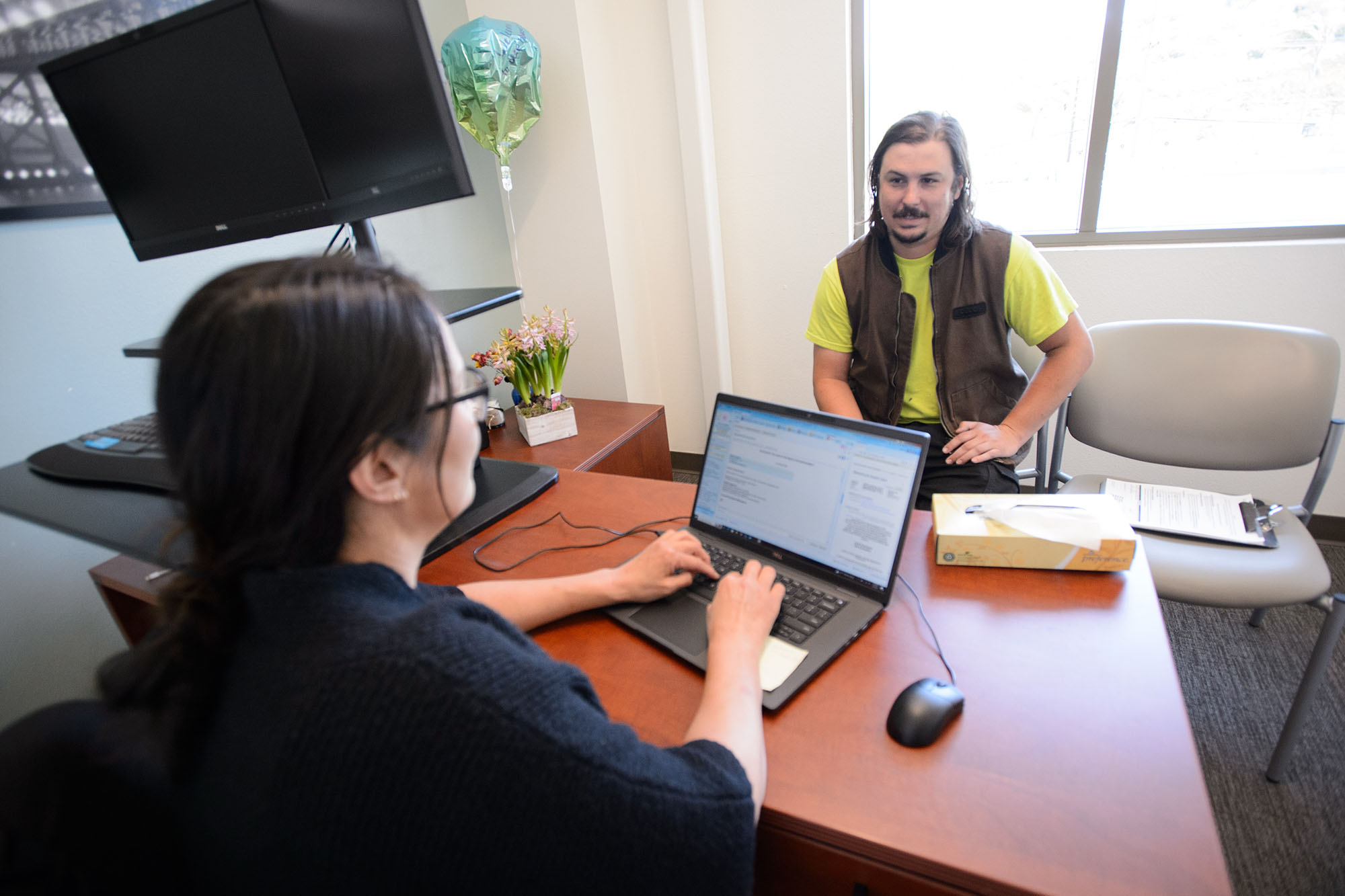Recently, AbleTo won the inaugural Association for Community Affiliated Plans (ACAP) Medicaid Innovation Challenge, cosponsored by the California Health Care Foundation’s Innovation Fund. AbleTo was chosen from a diverse field of more than 70 digital health companies offering solutions to the top challenges facing Medicaid health plans, as identified by ACAP’s member plans. The challenge winner receives $100,000 to work with an ACAP-member safety-net health plan.
AbleTo is a technology-enabled behavioral health care solution that offers eight-week, evidence-based phone or video coaching and therapy programs focused on specific behavior change goals. Although based in New York, AbleTo operates in many states, including California, and its provider network spans the nation. When asked what sets the company apart and enables it to serve Medicaid plans and patients, AbleTo chief clinical officer Aimee Peters, LCSW, tells the story of Cheryl, an AbleTo graduate. (Patient and provider names were changed to protect privacy.)

Cheryl was referred to AbleTo for poorly managed diabetes. Her health plan’s nurse case manager decided that AbleTo’s eight-week diabetes management program would improve her ability to manage her diabetes and her mental well-being.
But after getting to know Cheryl, Yvonne, her AbleTo therapist, changed course. Yvonne realized Cheryl was neglecting her diabetes because she felt that she couldn’t afford to care; she had to focus her scarce free time entirely on her child, who has autism. Cheryl lived in constant fear that her child was not receiving sufficient support, yet she felt helpless to improve the situation. She lacked financial resources and worked long hours at a job she could not afford to miss, yet she had missed work on multiple occasions due to complications caused by uncontrolled diabetes. She worried one more absence could be her last. Fear of losing her job monopolized Cheryl’s mind and energy.
Yvonne immediately switched Cheryl from the curriculum focused on diabetes management to one focused on the stresses of caregiving. Yvonne knew Cheryl would need to address the stress and anxiety caused by her caregiving responsibilities before she could begin to focus on her diabetes. Cheryl’s AbleTo therapist began working with her on improving her child’s support system. Together, they identified additional community resources and empowered Cheryl to make long-overdue changes to her child’s care team. One of the unique aspects of AbleTo’s network is that all its therapists are licensed clinical social workers with deep experience navigating community resources and government systems. Cheryl and her therapist made a plan to engage more family members in caregiving so Cheryl could feel more supported and less isolated.
Between weekly therapy sessions, Cheryl also worked with an AbleTo behavior coach on practicing the techniques for managing symptoms of anxiety and depression, and on developing habits that supported her self-care. Cheryl’s AbleTo care team also regularly checked in on her plans to improve her child’s care situation to ensure that the frustrations of navigating a complex array of social service agencies did not become a barrier to achieving her goals.
After the eight-week program, Cheryl reported feeling more resilient, more optimistic, and in better control of her anxiety and depression symptoms. She also reported spending more time taking care of herself, feeling better physically, and missing fewer workdays because of health issues.
Some people would call Cheryl’s life complications “the social determinants of health.” Some might also be considered matters of mental health. Regardless of labels, these factors that underlie physical health too often go unaddressed or even unnoticed by our health care system. The solution, according to Peters, is to make health care more proactive, integrative, and innovative. AbleTo aims to be part of that solution.
Transforming Behavioral Health Care from Reactive to Proactive Tool
Remarkably, half the people AbleTo reaches have had no prior diagnosis of depression or anxiety. “Traditionally, behavioral health care is very reactive,” Peters said. “Society waits for patients to walk through our doors, and by the time they do, they’re already in a crisis — or close to one.” Many people who could benefit from mental health support instead miss out on it.
To solve this, AbleTo runs medical, behavioral health, and prescription claims data from its health plan and employer customers through a proprietary algorithm to identify people at risk. It offers several ways for people identified as well-suited for its programs to learn about and enter one, including being directly referred by a provider or health plan case manager.
A classic example of AbleTo catching someone who might otherwise slip through the cracks is a family’s sole breadwinner experiencing a sudden cardiac event. “This person is so focused on recovering quickly that he or she may not realize the emotional toll that this event has taken,” she said. Even if this person does realize it, they may not seek support because of being too focused on returning to work or not being “the kind of person” who needs behavioral health care. AbleTo refers this person into therapy provided in an approachable, convenient format.
Integrating the Physical, Mental, and Social Aspects of Health
AbleTo’s programs focus on managing depression, anxiety, and stress associated with a chronic medical condition or life event. For example, some programs help people manage social circumstances, such as being postpartum or caring for a child with special needs. Others emphasize improving management of specific physical health conditions, such as chronic pain and diabetes. For those programs, AbleTo measures progress along both mental health and physical metrics, such as morning blood-glucose levels for diabetics. All programs also support participants in navigating community resources, which can provide sustainable support long after the eight-week program ends.
A core principle of AbleTo’s model is that a person’s physical and mental well-being are inextricably linked. The company’s outcomes data, including this recent study on its chronic pain program, strongly support that idea. Another core principle of AbleTo is a commitment to measuring outcomes. “Too often therapy is a black box, and neither the provider nor the patient knows if it’s working. We aim to be transparent and want to prove therapy’s potential for impact,” Peters said.
Another way in which AbleTo facilitates a more integrated and transparent approach to care is through its emphasis on communicating and coordinating with other providers. At each opening session, every AbleTo therapist requests consent from the patient to communicate and coordinate with their other providers. AbleTo’s online portal enables therapists to easily track and share treatment goals and progress with the rest of a patient’s care team, which can coordinate services online or by phone.
Using Technology to Expand Workforce Capacity, Make Care Convenient
For people who struggle with transportation access, live far from providers, or work long hours, the targeted curricula and availability of help 24/7 in English or Spanish enables AbleTo to deliver more customized and convenient care.
AbleTo’s virtual approach helps maximize the capacity of a mental health workforce that often is stretched thin. Its therapists can work with patients far from their offices but within the state where they are licensed. Many AbleTo providers work at traditional practices during the day and conduct AbleTo sessions at night or on weekends.
AbleTo’s focus on expanding access, combined with its emphasis on integrated, coordinated care, helps explain how it won the ACAP Medicaid Innovation Challenge. “AbleTo’s work is a natural fit for the care management activities of our safety-net health plans,” said ACAP CEO Meg Murray. “The company’s [model holds] a great deal of promise for improving access to needed behavioral health services for low-income patients.” That need is especially great among Medicaid enrollees, who are disproportionately affected by both mental illness and stressors such as poverty and trauma.
In addition to the $100,000 prize, AbleTo will get the chance to pilot its solution with an ACAP-member safety-net plan. The company is currently in the process of meeting with ACAP members to find the right partner.
Authors & Contributors

Leslie Walker
Leslie Walker is a senior producer for Tradeoffs, a podcast exploring the confusing, costly, and often counterintuitive US health care system. She formerly served as communications consultant for the CHCF Innovation Fund. Prior to working with CHCF, Leslie led communications for the UCSF Bixby Center for Global Reproductive Health. Before that, she was a senior manager at SIRUM, a social enterprise start-up that connects organizations with surplus medications to patients in need. Earlier, she was a senior account executive at Fenton, a leading social-change communications firm, where she focused on media relations and message development for health care foundations and nonprofits.
Leslie received a bachelor’s degree in political science from Brown University.



